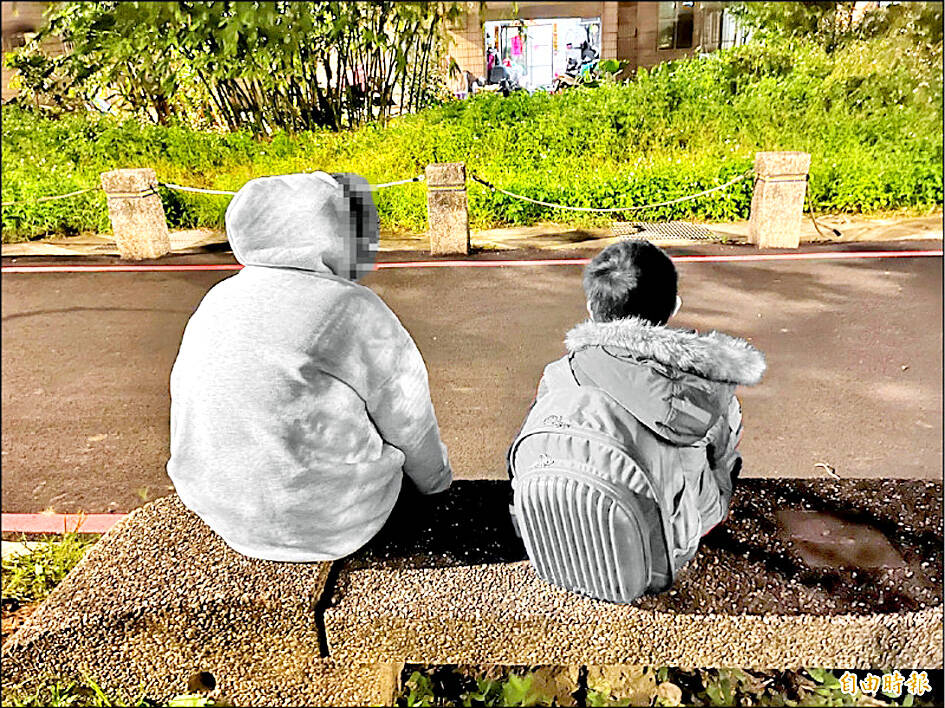The National Human Rights Commission is asking government agencies to assist a teenager and her younger brother in obtaining citizenship, after finding out they are undocumented after being born to a Vietnamese mother with no legal status in the country.
The case highlights deficiencies in the nation’s household registration and social welfare system, which have led to the children’s basic rights being affected, as they face restrictions to their education, health insurance and related government services, the commission said in a statement on Wednesday.
The commission issued the statement after local media reported that a 15-year-old girl, identified as “Siao Si” (小西), and her nine-year-old brother did not have a household registration despite being born in Taiwan.

Photo: Ho Yu-hua, Taipei Times
Siao Si’s case gained attention last year when she finished Grade 9. She was not allowed to join her classmates on their junior-high school graduation trip, because group insurance was required for the bus journey and she could not register for it due to her lack of citizenship.
Although their father is Taiwanese, the children’s births could not be registered because their mother had no official status after she left her legal job.
While working as an undocumented migrant worker, she gave birth to Siao Si and her brother. Their mother is reportedly married to a man in Vietnam.
A social worker who knows the family and has assisted them for many years said there are numerous legal barriers when an undocumented migrant worker gets pregnant in Taiwan, as it involves the Nationality Act (國籍法) and the Immigration Act (入出國及移民法).
The immigration authorities had tracked down the mother years ago, and were ready to send her back to Vietnam, but she was treated as a “special case” and allowed to stay with her family, the social worker said.
“The government has on humanitarian grounds provided basic protection, family services and social programs for children born to undocumented migrant workers, but each country has their own national security and particular factors to consider,” the social worker said.
“These children are granted a temporary resident certificate, allowing them to attend a local school, and to take the entrance examinations for high school, college and university,” the social worker said. “However, these children cannot write any professional certification examinations or any qualification tests that require the Taiwan citizenship ID card.”
“When they reach adulthood, the basic services and welfare programs for children are withdrawn, and their situation gets much worse, as without an ID card, they cannot get a legal job and face many difficulties,” she said.
Legally, the mother must take both children back to Vietnam, and obtain government authorized documents proving she is no longer married to her husband in Vietnam and that he is not the father of the children.
Her Taiwanese husband must undergo a DNA test to prove he is the father, and the couple must take the government documents to their local district household registration office to register the children’s births in Taiwan before they can obtain citizenship and identification papers.
However, the father is opposed to the mother taking their children to Vietnam, as he is concerned for their safety, and the mother is unwilling to go back to face government bureaucracy, the social worker said.

The brilliant blue waters, thick foliage and bucolic atmosphere on this seemingly idyllic archipelago deep in the Pacific Ocean belie the key role it now plays in a titanic geopolitical struggle. Palau is again on the front line as China, and the US and its allies prepare their forces in an intensifying contest for control over the Asia-Pacific region. The democratic nation of just 17,000 people hosts US-controlled airstrips and soon-to-be-completed radar installations that the US military describes as “critical” to monitoring vast swathes of water and airspace. It is also a key piece of the second island chain, a string of

A magnitude 5.9 earthquake that struck about 33km off the coast of Hualien City was the "main shock" in a series of quakes in the area, with aftershocks expected over the next three days, the Central Weather Administration (CWA) said yesterday. Prior to the magnitude 5.9 quake shaking most of Taiwan at 6:53pm yesterday, six other earthquakes stronger than a magnitude of 4, starting with a magnitude 5.5 quake at 6:09pm, occurred in the area. CWA Seismological Center Director Wu Chien-fu (吳健富) confirmed that the quakes were all part of the same series and that the magnitude 5.5 temblor was

Taiwan will now have four additional national holidays after the Legislative Yuan passed an amendment today, which also made Labor Day a national holiday for all sectors. The Chinese Nationalist Party (KMT) and Taiwan People’s Party (TPP) used their majority in the Legislative Yuan to pass the amendment to the Act on Implementing Memorial Days and State Holidays (紀念日及節日實施辦法), which the parties jointly proposed, in its third and final reading today. The legislature passed the bill to amend the act, which is currently enforced administratively, raising it to the legal level. The new legislation recognizes Confucius’ birthday on Sept. 28, the

The Central Weather Administration has issued a heat alert for southeastern Taiwan, warning of temperatures as high as 36°C today, while alerting some coastal areas of strong winds later in the day. Kaohsiung’s Neimen District (內門) and Pingtung County’s Neipu Township (內埔) are under an orange heat alert, which warns of temperatures as high as 36°C for three consecutive days, the CWA said, citing southwest winds. The heat would also extend to Tainan’s Nansi (楠西) and Yujing (玉井) districts, as well as Pingtung’s Gaoshu (高樹), Yanpu (鹽埔) and Majia (瑪家) townships, it said, forecasting highs of up to 36°C in those areas